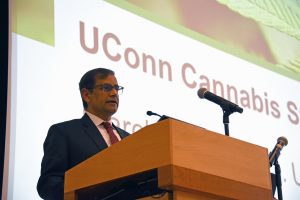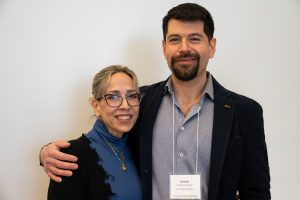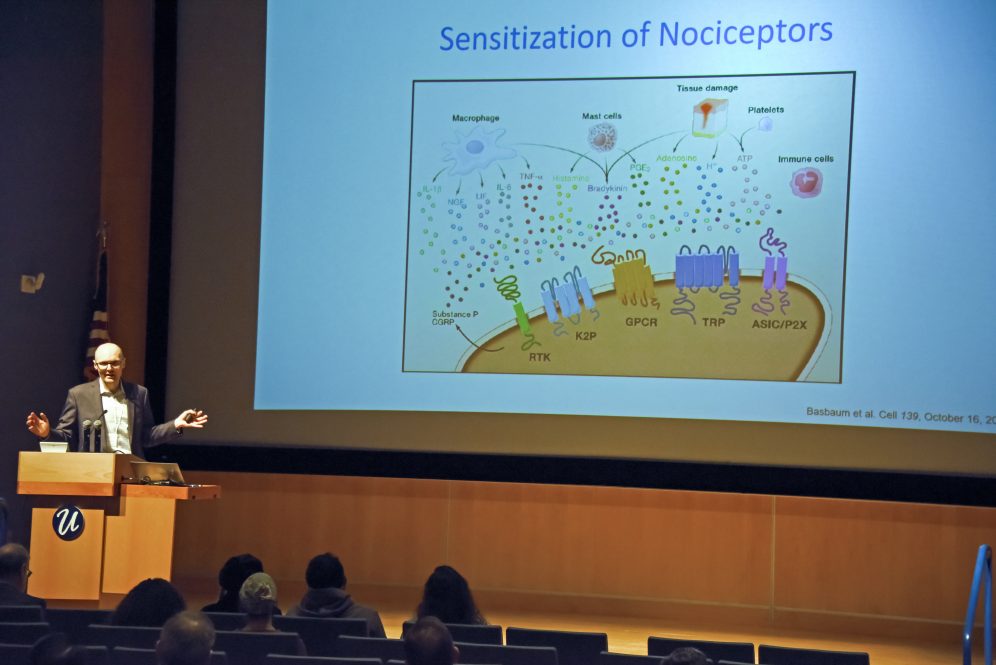Against the backdrop of the state’s expanded support for cannabis research and industry, UConn welcomed a range of experts, business leaders, and consumers for a cannabis symposium on March 16 and 17.
The symposium was convened to discuss a burning topic in Connecticut’s political, economic, and moral foregrounds. In January, cannabis became legal in the state for medical and recreational purposes, creating new opportunities for revenue while advancing discussion on the safety and research potential.

These topics were covered in detail at the symposium, which featured many UConn researchers as well as presenters and speakers from across the state and country. Held at the Student Union, topics covered a variety of topics, from health and medicine, entrepreneurship, and recreation to legal issues and morality surrounding cannabis.
“This event emerged from the desire to further reinforce these important connections between scientific research and the business community in the cannabis field,” said Indrajeet Chaubey, dean of the College of Agriculture, Health, and Natural Resources (CAHNR). “As a national leader in cannabis research and a land-grant university, UConn is uniquely positioned to serve as this hub, with this event being just one example of the progress and potential we seek to support.”
Cannabis research has become a major focus for UConn as the state considers policy and seeks advancement in related fields. Several of the University’s schools and colleges joined with private companies to present to the symposium, including CAHNR, Law, Medicine, Nursing, Pharmacy, and Liberal Arts and Sciences, as well as UConn Research.
“As perspectives have shifted, legislation has followed public opinion in states across the country. In Connecticut, cannabis was approved for medical use in 2012, and, since last year, businesses around the state have begun offering it for adult recreational purposes,” said UConn President Radenka Maric. “As Connecticut’s public research university, UConn is committed to being a vital resource in this new field, in every aspect from horticulture to health care to the specifics of state law.”
Sessions reflected the diversity of research and applications for cannabis. While some presenters focused on cultivation and maximizing crop output, entrepreneurs discussed the rise of dispensaries and the economic potential of a new industry. Law and policy experts offered insight as the state continues to establish rules and regulations.
Presenters also explored the medicinal impact of cannabinoids and implications for patients suffering from physical and emotional pain. William Zempsky, the division head of pain and palliative medicine and associate chair for research at Connecticut Children’s Hospital department of pediatrics, said that while there is argument among researchers about whether cannabis is effective for pain relief, pharmaceutical companies are spending millions in cannabis research.
“Pharma clearly has a clear interest, and they are not going to spend all their money unless there’s a clear interest there,” Zempsky said.
School of Nursing Dean Deborah Chyun remarked on the implications of cannabis research in further helping in the treatment of chronic pain as well as mitigating dependence on opioids.

“We recognize the global need for a variety of different types of providers and interventions that can address the burden of chronic pain, while reducing risks of over-utilization of opioid medications,” Chyun said. “Along with professional and lay health care workers, nurses who have a reputation for being trusted and approachable, have an important role in developing and delivering, evidence-based therapies, including use of cannabis use.”
Beyond pain, presenters detailed the possibilities for cannabis as a possible cancer treatment. Jamie Brambila Fernandez, the co-founder of Grace Health and Wellness, described working closely with UConn chemists to refine a process of administering infused tea to his wife, Nicole, as she battled breast cancer. Her recovery was incredible, allowing her to attend the symposium with her husband.
The two-day symposium also featured a plenary address from Aron Lichtman, a professor of pharmacology and toxicology at Virginia Commonwealth, as well a poster session and vendor display.



